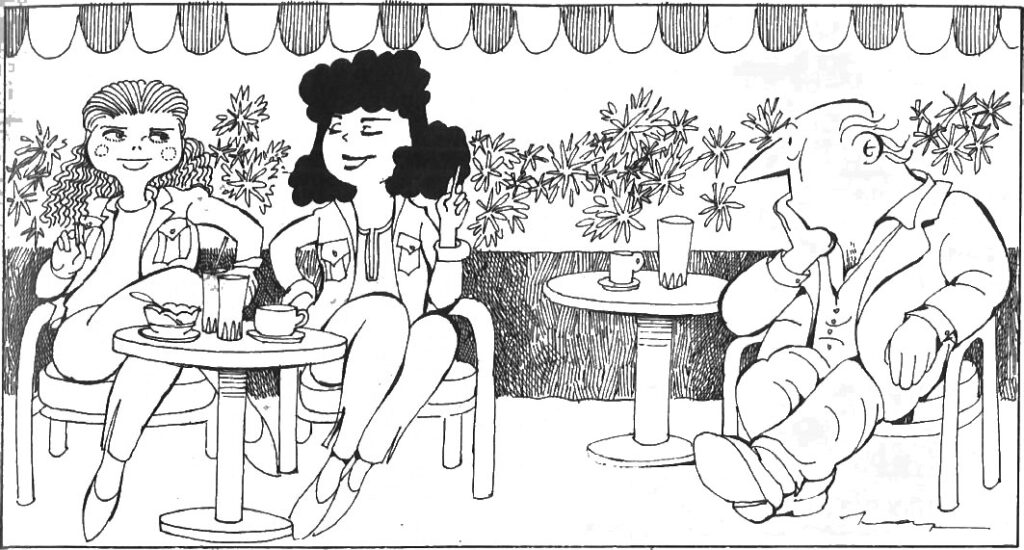
Whenever I happen to be passing through the Square, I keep a lookout for him and if I see him sitting at his favourite table, I make a large detour to avoid him. He’s not a bad fellow, really, but he always has a bee in his bonnet and if you should succumb to his insistent invitation to sit down and have a kafedaki with him you will have to spend at least an hour listening to him holding forth on his latest bete noire. The other day, I saw him sitting there, ogling a couple of teenage wenches in corduroy jeans and tight-fitting sweaters at a nearby table, but I could also see he was doing it out of longstanding habit and that his heart wasn’t in it. Moreover, the greenish cast on his sallow complexion, caused by daily inhalations of high levels of carbon monoxide and the colour of the awning above him, was deeper than usual. He looked decidedly out of sorts.

My compassionate nature got the better of me so I went up to him and accepted his invitation to sit down and have a kafedaki with him.
“What’s the matter, Yanni?” I asked,. “You look as if you’ve just crawled out from under a capsized island platform.”
He smiled wanly and kept staring at the girls. Then he sighed and said, “It’s not fair.”
“What’s not fair, old friend?”
“The Onassis prizes. They shouldn’t have given them to Harold Macmillan and Simone Veil.”
“And why not?” I asked, “Don’t you think they deserved them?”
“Oh, yes. I have nothing against them. I think Macmillan is an admirable fellow, and I have the greatest respect for Madame Veil.”
“Well, then, why shouldn’t they get them?”
“Because, my dear chap, if the Onassis Foundation wants to emulate the Nobel Committee it simply must not give the prizes to famous people. It just isn’t done. Famous people are rewarded by their celebrity.
The object of such prizes is to reward humble and obscure people who work unknown and unsung for the good of humanity,” Yanni said earnestly.
“Don’t you remember what Time Magazine wrote when the Nobel Prize for Literature was awarded to George Seferis?” he went on.
“No, what was it?”
” Once more, the Nobel Committee has succeeded in awarding the Literature Prize to a poet of monumental obscurity.’ That’s what they wrote because they knew that was the function of the Committee and the guiding principle Alfred Nobel had in mind.”
“And you think the Onassis Foundation committee is not abiding by the guiding principles of Aristotle Onassis?” I asked.
“I don’t know about that,” Yanni said. “If he were still alive and still in charge of his tanker operations he would probably have awarded the prizes to King Khaled of Saudi Arabia and the Ayatollah Khomeini, but that’s beside the point. As I said before, these prizes are intended to reward and give recognition to people who work quietly and behind the scenes for the good of their fellowmen.”
“Such as?”
“Such as me, for instance.”
“You?”
“Yes, me. Why not? The ‘Athenae’ prize is supposed to be awarded to ‘persons who contribute, with their activities and their works, to the rapprochement of peoples and the respect for human dignity.'”
“And what have you done in that line, for goodness’ sake, Yanni?” I expostulated.
“What do you think I did for thirty-five years in the Ministry of Transport and Communications, sitting behind a little window and explaining to foreigners why they could only get two extensions to the tax-free privileges on their cars and all the other intricacies of Greek customs and road-tax laws. Yes, my friend, they would come to me, after having been sent around to five different government offices in various parts of the city, and I would calm their exacerbated tempers with my dignified demeanour and my reasoned and persuasive arguments. Phlegmatic British motorists, struggling hard to maintain their traditional aplomb; excited Frenchmen, waving their arms at me and releasing a torrent of Gallic abuse; volatile Italians; barking Germans; bewildered Scandinavians; bemused Arabs — I would have them all eating out of my hand and, not only that, but I would introduce them to each other and after I had straightened them out, they would all leave together like one big happy family and have lunch in the tavema round the corner. Now, if that isn’t contributing to the rapprochement of peoples, I don^t know what is.”
“And what about respect for human dignity?” I pointed out.
“I made them respect my human dignity,” Yanni said. “I made them realise they couldn’t push me around.”
I shook my head. “I’m sure you did a great job, Yanni,” I said, patting his arm. “But I still don’t think you’d qualify for a prize, however sincere and obscure you may have been.”
“You don’t? Not even half a prize, $50,000? I could do a lot with $50,000.”
I shook my head again.
“How about a quarter prize? I wouldn’t mind sharing it with three other obscure people.”
“What about the other prize?” I suggested. “Have you done anything for the solution of ecological and environmental problems?”
Yanni thought very long and hard. Then he brightened a little and said, “I cleaned up a beach once at Porto Rafti,” he said. “I picked up all the old bottles of suntan lotion, the watermelon rinds, the empty sardine cans and one or two old bikini tops —”
He stopped when he saw I was shaking my head once more and sighing.
“Yanni,” I said, “you’re a fine chap, but sometimes I think you’re a teeny-weeny bit too ambitious. The ways of the Nobel Committee may sometimes seem strange and the Onassis Foundation Committee may not yet have embarked on an obscurity kick, but I’m sure they always act with the best intentions. You mustn’t blame them and you mustn’t feel sorry for yourself.”
It was Yanni’s turn to sigh. “I reckon you’re right,” he said, “but do me a favour, will you?”
“Certainly, Yanni, what is it?”
“If you hear that those sperm bank people who want to turn out geniuses are looking for someone in Greece, you’ll tell them about me, won’t you?”







